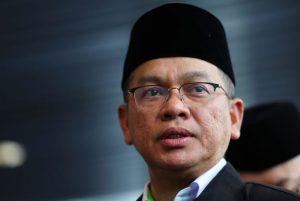By Fadli – Jakarta Post
 The Indonesian Ulema Council (MUI) has gone to court to challenge the government’s authority to certify halal products, a move seen as an attempt by the organization to regain its decades-old control over the certification.
The Indonesian Ulema Council (MUI) has gone to court to challenge the government’s authority to certify halal products, a move seen as an attempt by the organization to regain its decades-old control over the certification.
Directors of MUI’s food and drug analysis agencies (LPPOM) from 31 provinces across the country have lodged a petition for a judicial review with the Constitutional Court, challenging three articles in the 2014 Halal Product Assurance Law.
The petition was filed roughly two months before the law, which obliges all products sold in Indonesian market to obtain halal certificates issued by the Halal Certification Agency (BPJPH), took effect on Oct. 17.
The plaintiffs specifically disputed the authority of the BPJPH, a government-mandated body set up under the Religious Affairs Ministry with responsibility for managing halal certification.
In the petition’s dossier, the plaintiffs argued that the shifting of halal certification authority to the BPJPH would create a sense of uncertainty among members of the public, particularly business owners.
They also doubted whether the BPJPH could perform efficiently in comparison to the MUI, which had “30 years of experience” in managing and issuing halal certificates.
Ikhsan Abdullah, the lawyer representing the plaintiffs, further argued that the BPJPH was not yet prepared to exercise its authority and responsibility as stipulated in the law.
For instance, Ikhsan said that so far, there were no halal products guarantor institutions (LPH) in the country that had been accredited yet by both the MUI and BPJPH.
According to the law, the LPH are tasked to audit the production of products to be certified halal. Each LPH, which could be set up in universities or civil society organizations, should have a minimum of three auditors certified by the MUI.
Meanwhile, the LPPOM of the MUI currently have 1,601 certified halal auditors in offices across the country’s 34 provinces.
“Therefore, it will be difficult for businesses and industries because of the lack of assurance in certifying halal products,” Ikhsan told The Jakarta Post.
Ikhsan said that once the law went into effect, it would threaten the employees and the existence of the LPPOM as an organization.
The head of the Riau Islands’ chapter of the MUI’s LPPOM, Khairuddin Nasution, who was also one of the plaintiffs, maintained that the halal certification practiced by the organization had become a reference for other countries.
“It means that the halal certification system under the LPPOM MUI has been doing well,” he said.
The MUI and the government had for years been involved in a tug-of-war over the authority to certify halal products before the 2014 law was passed, giving control to the government.
Soon to come into effect, the law strips the MUI of its authority to manage halal certification — which it has held for decades — and gives it to the BPJPH, which would regulate applications and collect the fees for issuing certificates.
The head of the BPJPH’s halal auditor and businesspeople management division, Khotibul Umam, however, said that the government did not scrap the MUI’s role altogether.
“The MUI will still be involved as the authority to issue halal edicts, but the BPJPH will be the one to issue the halal certificates,” he told The Post.
Khotibul said that starting Oct. 17, producers would need to apply for halal certification to the BPJPH and he promised that the agency would implement a simpler and faster system with more affordable fees.
Those who wanted to obtain halal certificates could apply through an online system and the certificates would be issued in a maximum of 62 working days, he said.
He said the fees, especially for small and medium enterprises, would be lower than those of the MUI, which charged Rp 4 million (US$280) to Rp 5 million for a halal certificate.
“The Finance Ministry is still calculating the fees for the certificates, but we can guarantee that they will be cheaper because this is by the government,” Khotibul said.
As the halal certification — which previously had been voluntary — would be mandatory, the government estimated earlier this year that it could earn Rp 22.5 trillion (US$1.6 billion) in revenues from the certification of various products, including those produced by SMEs and large companies, after the law took effect.
When asked for a comment, LPPOM MUI central director Lukmanul Hakim said that he believed the 31 regional directors filed for the judicial review only because of a “misinterpretation” as the MUI itself did not have a problem with the law.
“Perhaps they filed the judicial review petition only to resolve the differences in their perception of the law,” he said. (tru/afr)



